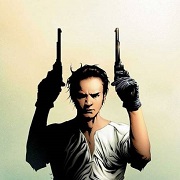|
BravestOfTheLamps posted:The way critical discussion ideally goes is that a proposition is put forth, and arguments are presented in its favour or against it. If it cannot be proven incorrect, it must be true. This isn't actually true at all. You can make totally incoherent claims that cannot be proven wrong because there is no metric by which they can be proven wrong. But let's roll with this for a minute. BravestOfTheLamps posted:Your propositions here are based on misreadings of my posts and of the concept of subjectivity. Here you have shown a misreading of my post and of the concept of liking things. The falsification principle works in science because scientific findings are replicable, and on the back of many replications, can be taken as objective truth (or as near to it as is attainable). The falsification principle does not work in art because the values on which works of art are judged are not by their relation to objective truth, but by how people respond to it, subjectively (by definition). Nobody needs to disprove your propositions that 'this book is bad' because you aren't making a meaningful proposition about the state of the world. If you claim otherwise you are, indeed, claiming veto power on other peoples' personal experiences, which is insane. I put forth a proposition - literary 'merit' is a meaningless construct invented by English departments to justify their funding, giving them a reason to read too heavily into things and waffle on endlessly about devices that nobody else cares about. Your insistence on using it as a totally independent metric from subjective enjoyment is without substance, and is actually indoctrinated into you by said English departments, leaving you incapable of empathising with other peoples' experiences of art. If you are unable to prove this proposition false, then it remains true and invalidates your central point that a given work can objectively lack merit. BravestOfTheLamps posted:What people instead generally do is retreat into subjectivity instead of expressing it. In nerd circles you will find a consistent misreading of subjectivity: when something is "subjective," it means that enjoyment or appreciation of something is an inexpressible secret, and denying that means denying a person. It is perfectly fine to say, "well, I like it"... but if you want to discuss whatever "it" is in this case, then surely you should express why you find it worthwhile! Don't use "subjective" as an argument! What makes this a misreading of subjectivity? That's what it means. Human experience is ineffable and cannot always be put into words, people only ever approximate what they truly feel based on the boundaries of our language and their own ability to express that experience. Education in a particular domain aims at providing you the tools you need to better express how certain things make you feel - this is why whiskey lovers use words like 'malty' and 'peaty', which are a convention that refer to particular flavours and textures but which have no meaning to me, as someone who doesn't give a poo poo about whiskey. People who don't know those words might not be able to fluently describe how a particular whiskey tastes to another person, but that doesn't mean they don't know why they like it or that they don't like it at all. When you're saying a book has merit, you're saying "this book does things that I, as a person educated in reading books, enjoy on a subjective level". You're also insisting that the things you enjoy on a subjective level are the only things worth enjoying on anyone's subjective level, which betrays the chauvinism I was hinting at in my last post.
|
|
|
|

|
| # ? May 26, 2024 12:12 |
|
You are not defending subjectivity - you are simply denying that subjects can express truth. I've always made my critical propositions very clear. For example, I have said that Kingkiller is not a story about anything but itself, which makes it irrelevant and pointless. This can be disproved by showing that Kingkiller actually tells a consistent story around some theme. Like it's about the failure of heroism (it isn't), about the emptiness of legends (it isn't), about the meaninglessness of fantasy (it isn't), or how artificial society and its positions are (it isn't). e: It might be about the power of stories,, though! The rest of your argument depends on some weird conspiracy theories against academia - English Departments trick everyone into believing there are standards in art? Your proposition is that artistic merit doesn't exist - this can be disproved by observing the aesthetic power and insight that art holds (your argument about the non-existence of merit cannot be limited to literature). One might say that the Notre Dame de Paris is a magnificent work of architecture - but if a subject thinks that pointed arches and buttresses are barbaric and not at all pleasing, claiming that it's magnificent becomes chauvinism. What you're describing is not subjectivity, but solipsism. e: Mostly, your argument revolves around the fallacy that enjoying art is always the same as art being good. e2: If you are going to post anything where "English departments" and "indoctrinated" are in the same sentence, I advise you take a break from posting and relax. BravestOfTheLamps fucked around with this message at 20:36 on Mar 1, 2016 |
|
|
|
BravestOfTheLamps posted:I have said that Kingkiller is not a story about anything but itself, which makes it irrelevant and pointless. Do you see One Day in the Life of Ivan Denisovich as irrelevant and pointless, then, or how do you draw that line?
|
|
|
|
BravestOfTheLamps posted:Like it's about the failure of heroism (it isn't), about the emptiness of legends (it isn't), about the meaninglessness of fantasy (it isn't), or how artificial society and its positions are (it isn't). e: It might be about the power of stories,, though! Literally all these things are "teased" in the book then completely undercut by not happening because Kvothe has to go on another badass journey where he kicks rear end and seduces women. No consequence has yet been shown in anything Kvothe does (but apparently it will...at some point) so every single time he panics because he can't afford tuition there's no real sense of drama or character building because we as the reader know he'll come up with another "brilliant" scheme the ends up working despite any number or mistakes or pitfalls. I'm no literature expert, but I know that failure and hardship are never going to be a consequence really sucks any sense of tension from the story. I think where I finally tipped over on hating WMF was when Kvothe is arguing with the Duke? and his wife and the wife is ranting about Edema Ruh or whatever and she keeps slandering them while Kvothe leads her on and then replies "I know because I AM Edema Ruh" and then she's stunned into silence. It was the same with the metal bands that people drop into bowls to denote status, Kvothe gets one that denotes his super badass status so then everyone will stare at him gob-eyed because he's the greatest. That's at the level of "and then everyone stood up and clapped" for the stdh.txt thread, and yet jivjov wants to scream about how great the books are and will now re-read one again out of spite that I suggest he read something new.
|
|
|
|
BravestOfTheLamps posted:Irony of ironies, you have misread my proposition. Personally, I like reading your analysis, but it would be nice if you explained why the things you say are bad, are in fact bad. For example, you say that it is weird to mix Pagan and Christian myth, but why? I'm not saying that Rothfuss does it well, but it seems like you could use the mixing of two different myths to say something meaningful. It's important to make a distinction between things that are bad to do and things that Rothfuss doesn't do well.
|
|
|
|
pentyne posted:Literally all these things are "teased" in the book then completely undercut by not happening because Kvothe has to go on another badass journey where he kicks rear end and seduces women. No consequence has yet been shown in anything Kvothe does (but apparently it will...at some point) so every single time he panics because he can't afford tuition there's no real sense of drama or character building because we as the reader know he'll come up with another "brilliant" scheme the ends up working despite any number or mistakes or pitfalls. I'm no literature expert, but I know that failure and hardship are never going to be a consequence really sucks any sense of tension from the story. I think that sort of ends up being my biggest problem, despite my enjoyment of it. It's set up like "Those legend you've heard aren't as true as you think they are", and so far, he's just as cool as his stories say. He got paid to attend University. He slayed a dragon. He hosed a fairy super well. He learned special karate from sex ninjas. At no point after he gets to University is he even sort of not the raddest dude around. If he killed the dragon by mistake, or maybe people just assumed he hosed real good because he wouldn't go into detail about his time with Felurian or the ninjas, then fine. But christ, he's exactly what his legend is so far. I feel like the ultimate point of the story will be that he doesn't think what he's done is as cool as it is because of one egregious mistake or something. Like, he let that one thing ruin his entire perception of himself. It'd be stupid, but I won't be surprised.
|
|
|
|
Dagg3r posted:Personally, I like reading your analysis, but it would be nice if you explained why the things you say are bad, are in fact bad. For example, you say that it is weird to mix Pagan and Christian myth, but why? I'm not saying that Rothfuss does it well, but it seems like you could use the mixing of two different myths to say something meaningful. It's important to make a distinction between things that are bad to do and things that Rothfuss doesn't do well. I may be wrong, but I think the criticism wasn't the content of the mythology, even though he found it to be odd, or weird. The real criticism was that it was rather lengthy and did little to establish anything about the church or the in-world consequence of the mythology. It was like a really long teaser without any payoff.
|
|
|
|
It's odd because pagan and Christian myth aim for different things. Pagan myths are originally explanations for natural phenomena while Christianity (even Judaism) carries a social/political message. There's no real grounds on which they meet apart from supernatural occurings - and that feature loses its meaning since it's a fantasy novel. As such, organized worship based on the story would feel really schizophrenic due to the mixed messages the myth gives. SpacePig posted:I think that sort of ends up being my biggest problem, despite my enjoyment of it. It's set up like "Those legend you've heard aren't as true as you think they are", and so far, he's just as cool as his stories say. He got paid to attend University. He slayed a dragon. He hosed a fairy super well. He learned special karate from sex ninjas. At no point after he gets to University is he even sort of not the raddest dude around. If he killed the dragon by mistake, or maybe people just assumed he hosed real good because he wouldn't go into detail about his time with Felurian or the ninjas, then fine. But christ, he's exactly what his legend is so far. anilEhilated fucked around with this message at 21:21 on Mar 1, 2016 |
|
|
|
|
BravestOfTheLamps posted:You are not defending subjectivity - you are simply denying that subjects can express truth. Nothing can express objective truth. Rigorous scientific inquiry can come close to it, but no science claims to know objective truth, only that certain theories or models are the current best ways to explain the observed evidence. BravestOfTheLamps posted:I've always made my critical propositions very clear. For example, I have said that Kingkiller is not a story about anything but itself, which makes it irrelevant and pointless. This can be disproved by showing that Kingkiller actually tells a consistent story around some theme. Like it's about the failure of heroism (it isn't), about the emptiness of legends (it isn't), about the meaninglessness of fantasy (it isn't), or how artificial society and its positions are (it isn't). e: It might be about the power of stories,, though! You are saying those things, but those things have no qualitative valence attached to them - there is no evidence that these elements of the book make it lack objective merit apart from your say-so. If it was about the failure of heroism, would it be better? Why would that make it better? (the answer is because you would enjoy it more!) BravestOfTheLamps posted:The rest of your argument depends on some weird conspiracy theories against academia - English Departments trick everyone into believing there are standards in art? Your proposition is that artistic merit doesn't exist - this can be disproved by observing the aesthetic power and insight that art holds (your argument about the non-existence of merit cannot be limited to literature). One might say that the Notre Dame de Paris is a magnificent work of architecture - but if a subject thinks that pointed arches and buttresses are barbaric and not at all pleasing, claiming that it's magnificent becomes chauvinism. The "aesthetic power and insight that art holds" is subjective, and it's not proof of anything. That isn't solipsism. It's basic empathy. Not everyone feels the same things in reaction to external stimuli. One might say that the Notre Dame is magnificent. Someone else might disagree, and say it looks overwrought and egregious, or even that it's nothing special compared to other, more interesting works of architecture. Both can justify their experiences and interpretations of the work. Neither can claim objective truth as to the matter. As it happens, I think Machu Picchu is breathtaking on a level that Notre Dame doesn't approach, I much prefer Monet to Picasso, and I think Shakespeare is overrated compared to, say, Oscar Wilde. You are really invested in equating "people who are educated about art tend to enjoy this piece of art" with "this piece of art is objectively good". But how can one test if a piece of art is objectively good? What external phenomenon does that theory predict?? BravestOfTheLamps posted:e: Mostly, your argument revolves around the fallacy that enjoying art is always the same as art being good. Actually, I'm rejecting the concept of 'good art' entirely, because it's impossible to define in relation to the external world. BravestOfTheLamps posted:e2: If you are going to post anything where "English departments" and "indoctrinated" are in the same sentence, I advise you take a break from posting and relax. Do you seriously think that any academic field isn't fully capable of inventing justifications for itself to exist and cleaving blindly to authority and doctrine instead of entertaining original critical thought and attaching value to works simply because of the name attached to them? (because that one definitely happens all the time in art) This goes doubly for the arts and social sciences, which don't even have reliable findings to fall back on. I say this as someone who has worked on both sides of the science/social science spectrum - fields like sociology and economics have major elements of cargo cult science, where appealing theories are repeated and 'verified' by anecdote despite the lack of actually rigorous data supporting those theories (and often even in the face of strongly disconfirmatory evidence). In my (scientific) field, we've somehow managed to convince everyone of the superiority of null hypothesis significance testing even though it's batshit and you can't get anywhere by just reporting p-values, but it's what the majority of psychological researchers have been doing for almost the entire lifetime of the discipline. I fully suspect that the field of literary criticism is not only capable of this, but has actively engaged in it for generations. There is no evidence for the objective existence of literary merit. I'm undecided about cases like, for instance, the people who claim to truly appreciate the artistic works of Pierre Brassau, who is a four-year-old chimp from a Swedish zoo. They may genuinely enjoy the chaotic childish mess of paint on canvas, in which case I still think they'd be stupid for spending a lot of money on those paintings, or they might have fallen prey to this indoctrination I mentioned and started praising things that sound avant-garde because they think they should, but either way I don't think it diminishes my point. I'm sorry to take up your time with arguing the nature of subjectively liking things instead of posting about why Rothfuss is crap, because I'd happily read your opinion about why Rothfuss is crap, only I object to the pretension that you claim to know it as objective truth.
|
|
|
|
Again, you do not defend subjectivity but devalue it by claiming that subjects cannot know the truth. Is it not strange that to prove that someone is not asserting the truth, you deny the possibility of truth altogether? And you can't even keep your story straight: Boing posted:Nothing can express objective truth. This is, in fact, an objective truth: an absolute, scientific value. You have fallen for the classic paradox: if nothing can express objective truth, then it is impossible to state that nothing can express the truth. Boing posted:You are saying those things, but those things have no qualitative valence attached to them - there is no evidence that these elements of the book make it lack objective merit apart from your say-so. If it was about the failure of heroism, would it be better? Why would that make it better? Again, your reaction to someone claiming that they assert the truth is to deny that truth exists (then how can one deny truth?). If enjoying art is an autistic experience, then how are we able to discuss it? We can make propositions about art, which is why we are discussing it. You are falling for the liberal trap of associating all imposition of values with evil. The paradox is similar to the earlier one - if it is chauvinist to impose values, then is it not chauvinist to impose values on imposing values? You are baffled by the idea of consensus, that a group of people might agree on something after a period of debate. You associate this with conspiracy: academics are corrupting society. This is paranoia. And you do not argue in good faith, as you are convinced I have been brainwashed by "English Departments" and the academic establishment (which one?). This is stupid. You are disgusted by the concept of belief. That is sad. BravestOfTheLamps fucked around with this message at 06:06 on Mar 2, 2016 |
|
|
|
He really touched a nerve with that jab at English departments, huh
|
|
|
|
Oxxidation posted:He really touched a nerve with that jab at English departments, huh If I ever visit one I'll let them know what Boing said.
|
|
|
|
Boing posted:I fully suspect that the field of literary criticism is not only capable of this, but has actively engaged in it for generations. There is no evidence for the objective existence of literary merit.
|
|
|
|
Boing posted:Do you seriously think that any academic field isn't fully capable of inventing justifications for itself to exist and cleaving blindly to authority and doctrine instead of entertaining original critical thought and attaching value to works simply because of the name attached to them? (because that one definitely happens all the time in art) You speak of the academic field as some monolithic entity that for which the mistakes of some are a condemnation of the whole. Here's a good example from the Sokal Affair you linked quote:At that time, the journal did not practice academic peer review and it did not submit the article for outside expert review by a physicist So not only was the paper not scrutinized, but no one at the magazine bothered to have a 3rd party review it. That's extremely common in a lot of garbage journals but is a well known issue and something members of the "academic field" takes into account when writing papers. It's called being human, and the entire point of substantive arguments is to try and remove the biases, emotional, and irrational aspects from the debate and explain it in "objective" terms.
|
|
|
|
This thread has inspired me to read Moby-Dick. Good going thread.
|
|
|
Strom Cuzewon posted:This thread has inspired me to read Moby-Dick. Good going thread.
|
|
|
|
|
Strom Cuzewon posted:This thread has inspired me to read Moby-Dick. Good going thread. You poor son of a bitch.
|
|
|
|
Strom Cuzewon posted:This thread has inspired me to read Moby-Dick. Good going thread. The Time I Spent On A Commercial Whaling Ship Totally Changed My Perspective On The World
|
|
|
|
Moby Dick rules, and the chapters that just talk about whales and whaling rather than advancing the narrative double-rule.
|
|
|
|
Peel posted:Moby Dick rules, and the chapters that just talk about whales and whaling rather than advancing the narrative double-rule. Someone from the Real Literature Thread said those chapters serve to take the mysterious monstrosity that is Moby Dick and attempt to define and reduce it into something that is known and benign. Or something. I don't really know because I haven't read it yet. Maybe I should now.
|
|
|
|
Flattened Spoon posted:Someone from the Real Literature Thread said those chapters serve to take the mysterious monstrosity that is Moby Dick and attempt to define and reduce it into something that is known and benign. Or something. I don't really know because I haven't read it yet. Maybe I should now. It's been a while since I've read Moby Dick but most of its allegory is pretty front and center. It's dense and wordy in the style of the period, but not an especially difficult read, I think. If nothing else you can always amuse yourself by looking out for the homoeroticism. Oxxidation fucked around with this message at 02:03 on Mar 2, 2016 |
|
|
|
So I just popped in the audio book for Name of the Wind after years of reading both books. It's been pretty good up until the troupe gets murdered, then I remember Tarbean being a lovely interlude, and the Arcanum/Academy/Wizard School being where it got good again. So I have two questions for this thread: 1) What chapter does he leave Tarbean so I can just skip to that 2) Is there any timeline whatsoever for when the 3rd book of Kingkiller will be out?
|
|
|
|
Maxwells Demon posted:So I just popped in the audio book for Name of the Wind after years of reading both books. It's been pretty good up until the troupe gets murdered, then I remember Tarbean being a lovely interlude, and the Arcanum/Academy/Wizard School being where it got good again. He leaves Tarbean in chapter 33. However, he arrives at the university chapter 36. Reason I mention this is because this is when we meet Denna in between these chapters. Also, the timeline is basically whenever he feels the book is good enough. Which is probably never. It wouldn't surprise me if he has a policy when if someone pisses him off about the third book not being out he stops working on it for the day.
|
|
|
|
Maxwells Demon posted:2) Is there any timeline whatsoever for when the 3rd book of Kingkiller will be out? A month after the Winds of Winter.
|
|
|
StoneOfShame posted:A month after the Winds of Winter. GRRM has actually provided excerpts from his next book, though,, so we can reasonably assume that at least SOME of the book is written, even if it's only those excerpts.
|
|
|
|
|
Ornamented Death posted:GRRM has actually provided excerpts from his next book, though,, so we can reasonably assume that at least SOME of the book is written, even if it's only those excerpts. And Rothfuss has at least an early early draft of Doors of Stone done; he's been sitting on it since college.
|
|
|
jivjov posted:And Rothfuss has at least an early early draft of Doors of Stone done; he's been sitting on it since college. Unless you want to take his other, later blog post as fact, in which case what he has is a solid outline and some text, but entire chapters that are just vague descriptions of what he wants to happen. Your choice, really. Edit: Actually let's be fair: he said that about the second book, not the third, though I can't imagine a world in which he has completed, if early, drafts of books one and three, but not two. Edit #2: While going back through my posts to find a previous discussion on the blog posts mentioned above, I found this. Now I don't keep up with Rothfuss like I used to, but I'm pretty sure that third item hasn't been released or even really talked about at all. It's entirely possible he dropped that project. It's also possible he finished it and is waiting for the right opportunity to release it, but I kind of doubt this since what basically amounts to a new novel by Rothfuss will shoot right to the top of the bestsellers charts, so the right opportunity is that absolute earliest moment he can turn it over to his editor. Or he may still be working on it, either instead of (per that reddit post) or in conjunction with book 3. Ornamented Death fucked around with this message at 03:12 on Mar 2, 2016 |
|
|
|
|
Oxxidation posted:If nothing else you can always amuse yourself by looking out for the homoeroticism.
|
|
|
|
the rape scene in Tarbean really bothers me when taken alongside other scenes in the books. Kvothe mentions in NOTW that he was also caught. Not much more is said about this, leading us to wonder if he was raped. I assumed he was at first - the slightly offhand "i was caught once too" seemed like a survivor's minimizing of a major trauma, or perhaps someone wanting to spare their audience (this being the Chronicler). But after a bit it seemed clear Kvothe just wasn't traumatized at all by this so I assumed he wasn't raped. Which turns out to be correct, as he brings up the event during the scenes with Felurian, where we see more of that specific scene, and we see that he fought off his attackers. And here's my problem - he remembers Tarbean and he specifically remembers resisting his attackers, and that memory seems to be what gives him the will to resist Felurian's glamour. I know it's not quite "victim blaming" to uhh, depict someone who was uhh "willful" enough to fight off rapists/a mind-controlling fairy sexpot. But something about this really rubs me the wrong way. And together with the embarrassing "not all men" Kvothe pulls with the women he just saved from their rapists, or when he tries to like caress a sleeping woman he's about to save from her rapists... Also uh where are there English departments that try to Objectively Determine Literary Merit? I don't think I've ever heard any of my professors discussing "merit" or even "quality" in regards to work. It's actively discouraged by a few as a waste of time. Are there really departments doing Indoctrination on our Nation's Tender Teens ???
|
|
|
|
Boing posted:The word 'meritorious' is dumb because nobody ever gives a coherent definition of it or justifies exactly why high literature is better than trashy genre fiction. One is not better than the other, they appeal to different tastes, and it's insane to try and push your tastes on somebody else actually, one is totally and self evidently superior, and many people have bad taste that should be destroyed
|
|
|
|
shallowj posted:And here's my problem - he remembers Tarbean and he specifically remembers resisting his attackers, and that memory seems to be what gives him the will to resist Felurian's glamour. I know it's not quite "victim blaming" to uhh, depict someone who was uhh "willful" enough to fight off rapists/a mind-controlling fairy sexpot. But something about this really rubs me the wrong way. And together with the embarrassing "not all men" Kvothe pulls with the women he just saved from their rapists, or when he tries to like caress a sleeping woman he's about to save from her rapists... Well, Rothfuss is an avowed feminist so there's clearly some deeper meaning to all of it that you missed.
|
|
|
|
ulmont posted:Do you see One Day in the Life of Ivan Denisovich as irrelevant and pointless, then, or how do you draw that line? One Day in the Life of Ivan Denisovich has a plot (man goes through a day in a prison camp), and it revolves around a central theme (enduring authoritarianism). It is about something. Kingkiller has no plot except for "things that happen to Kvothe," and no central theme around which the story revolves. It is not about something. E: And this can be disproven simply with another reading supported by the text. For example, I suspect that the books might be about how people are inhibited. BravestOfTheLamps fucked around with this message at 09:15 on Mar 2, 2016 |
|
|
|
BravestOfTheLamps posted:One Day in the Life of Ivan Denisovich has a plot (man goes through a day in a prison camp), and it revolves around a central theme (enduring authoritarianism). It is about something. People are confused because NotW DOES set out to be something. It has a call to action at the very beginning of the book, where the troupe is killed. Kvothe is set up to be hunting the Chandarian for revenge, and that motivates him to join the University. But it doesn't go anywhere. It is simply an event at the beginning of the novel that seemed like a good hook. Kvothe is set up to be a magical Count of Monte Cristo, but then he gets to school and it's like all his rage and drive as vanished. There are one or two callbacks to researching the Chandarian, but the novel is like someone who plays Fallout 4, gets the main quest, but never bothers finishing it because all their play time is spent putzing around with side quests and inventory management.
|
|
|
BravestOfTheLamps posted:One Day in the Life of Ivan Denisovich has a plot (man goes through a day in a prison camp), and it revolves around a central theme (enduring authoritarianism). It is about something. Kingkiller is about the evolution of the legend of Kvothe. Obviously without the third book we're missing a substantial part of the overall theme, which will almost certainly focus that admittedly generic premise down to a more discrete level, having to do with how his legend turned from Kvothe the Fancy Hero to Kvothe the Dude Who Killed a King and Is Now a Grumpy Bartender. NotW is the typical "book one of three" of the hero's journey type (I think?), wherein the protagonist learns the stuff he needs to be the "hero". NotW is specifically about Kvothe's becoming an Arcanist. WMF is the typical "book two of three", wherein the hero goes through a trial and matures. WMF is specifically about Kvothe growing up and learning not only the name of the wind, but also control over it. Doors of Stone will be the typical "book three of three" wherein the hero faces a threat to his existence and I don't actually know the rest of the trope with this one, I just know the third story is always the one where the hero comes the closest to death and the challenges are the biggest.
|
|
|
|
|
Nnnot really how the hero's journey works. I don't really see the "evolution of the legend" either - that'd assume the legend was different from the way he tells it and there's very little or no indication that it is so.
|
|
|
|
anilEhilated posted:Nnnot really how the hero's journey works. Okay I'm using the wrong word for it then. I just know that most trilogies work like this: 1) dude becomes hero 2) dude faces a challenge, becomes better/more mature hero 3) dude almost dies, probably discovers teh power of friendship, becomes turbohero Also, from what I can remember (it's been about a year), Kvothe's legend is actually much larger than his actual character. People talked about how he didn't feel pain or bleed (because of the drugs he took), how he summoned fire and lightning to attack Ambrose (name of the wind, accident), something about Felurian which was the closest to true but still blown out of proportion, how he learned the secret magic of the Adem (he just went there and learned about their culture and got his rear end beat) and then a bunch of stuff that will probably happen in the third book. I really distinctly remember him deliberately cultivating a larger than life persona while struggling to keep up with it at times (and mary sueing his way through it at others).
|
|
|
|
ChickenWing posted:Okay I'm using the wrong word for it then. I just know that most trilogies work like this: This seems more accurate for Kvothe and Rothfuss.
|
|
|
|
|
I've repeatedly stated the problem with that thesis - why is Kvothe's story so important? He's a living legend - but what is his legend? What does he represent? The answer is only his own exceptionality. It's not even in the sense that he represents heroism or adventure. Maybe anti-establishment cheekiness if you squint your eyes (or more accurately, close them). Kvothe is exceptional because he is exceptional. It's a self-referential nightmare.
|
|
|
Ornamented Death posted:This seems more accurate for Kvothe and Rothfuss. Yeah admittedly there's not much challenge in the second book, but it's still very much about him "growing up", "becoming a man", etc BravestOfTheLamps posted:I've repeatedly stated the problem with that thesis - why is Kvothe's story so important? He's a living legend - but what is his legend? What does he represent? The answer is only his own exceptionality. It's not even in the sense that he represents heroism or adventure. Maybe anti-establishment cheekiness if you squint your eyes (or more accurately, close them). Kvothe is exceptional because he is exceptional. It's a self-referential nightmare. There must be some literary definition of legend I'm not familiar with. He doesn't need to represent anything to be a legend as far as I know. He's an exceptional person that has cultivated stories that blow his exceptionality out of proportion. I'm guessing that the final book is going to have to do with him buckling under the weight of his legend, having to deal with having gone too far, finally reached too high, etc. Again, this is speculation, but the series so far is foreshadowing a major fall from grace that is almost certainly entirely his fault, and judging by the story so far, it's going to be because he built himself up too much, maybe enough that he started believing his own legend.
|
|
|
|
|

|
| # ? May 26, 2024 12:12 |
|
Kingkiller is about everything Rothfuss finds interesting, whether it be money systems, coupling thermodynamics with magic systems, sex, the concept of stories being distorted through different peoples interpretations and influences, people (or at least Rothfuss's concept of people) like Auri and Elodin, etc. and intertwining all of his interests into one story about a person like Casanova who goes on grand adventures and has sex a lot, but putting a fantasy twist in it and turning it into a tragic story. Thing is, Rothfuss tries to do all of these geeky things and they end up conflicting with each other and clashing. Lamps is pretty much spelling out instances where all of these different influences clash so there's no central theme to hold onto. Is this bad? I remember enjoying the NotW but when I finished I remember feeling the whole thing was kind of pointless and left me feeling a little empy and cold.
|
|
|




























